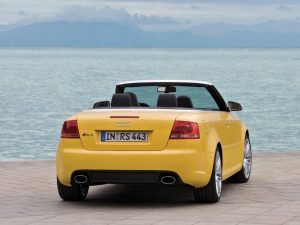Recalls: Audi B7 RS4 Cabriolet
Overview
Manufacturers, or importers, issue recalls for defects or faults which have the potential to cause injury. Generally, manufacturers will inform the original buyers if their vehicle is subject to a recall and of the steps required to remedy the defect or fault. Please note that the recalls below (if any) are for Australian-delivered vehicles only. Furthermore, the number of recalls should not be taken as an indication of a model’s reliability or its safety more generally.
Recalls: Audi B7 RS4 Cabriolet
Audi B7 RS4 Cabriolet: Takata airbag recall
In August 2018, a recall was issued for Audi B7 RS4 Cabriolets. The Takata driver’s airbag in these vehicles contained propellant wafers that could absorb moisture over time. In the event of a collision which triggered the driver’s airbag, excessive internal pressure could cause the metal airbag inflator housing to explode. This, in turn, would cause the metal fragments to be projected through the airbag cushion and into the cabin – these fragments posed a serious risk of injury and fatality. For the VINs of the recalled vehicles, please see PRA 2018/16949.
Problems and faults: Audi B7 RS4 Cabriolet
Overview
This section identifies potential problems, causes and fixes based on the experiences of owners and repairers, online sources and technical service bulletins. This information is provided solely for reference purposes and AustralianCar.Reviews recommends that only properly qualified persons carry out repairs or modifications. Furthermore, the number of items below should not be taken as an indicator of a model’s reliability or the frequency with which they may occur.
To report a problem or fault to the AustralianCar.Reviews team, please use the Contact Us form. Note that AustralianCar.Reviews does not offer advice on automotive problems or disputes; such enquiries will not receive a reply. For vehicles purchased from dealers after 1 January 2011, please see our Australian Consumer Law fact sheet.
B7 RS4 Cabriolet: carbon deposits (build-up) on intake valves
Audi’s naturally aspirated, direct injected petrol engines (such as the RS4’s 4.2 FSI) are considered susceptible to accumulating carbon deposits (or build up) on the intake valves. In these direct injection petrol engines, carbon deposits may accumulate on the stem and throat of the intake valve due to:
- the vaporisation of oil which is not trapped by the oil separator; or
- unburned fuel and exhaust gases that escape past the piston rings and enter the crankcase (‘blow-by’).
Since direct injection engines do not spray fuel on the backside of the intake valves, the detergent properties of the fuel cannot remove the carbon build up (as occurs in port injected engines). Symptoms of carbon deposits on the intake valve include difficulty starting the vehicle (hard starting), misfiring and misfire engine codes and reduced engine performance. Potentially, these deposits can result in damage to the catalytic converter and, for turbocharged engines, the turbocharger itself if bits of the deposit break off and enter the exhaust. To remove the carbon deposits, the intake must be removed and the valves cleaned manually. To reduce the incidence of carbon deposits, a common aftermarket measure is the fitment of an oil vapor catch can. The catch can receives dirty air from the crankcase via the Positive Crankcase Ventilation (PCV) valve, filters it and returns it to the intake manifold via the PCV port.
RS4 Cabriolet: Dynamic Ride Control failure
For Audi’s ‘Dynamic Ride Control’, the shock absorbers seals can deteriorate, causing the shock absorbers to lose their pressure. To fix, the DRC shock absorbers must be replaced or new seals fitted; specialist tools are required to replace the DRC shock absorbers and re-pressurise the system. While Dynamic Ride Control can fail without warning, a knocking noise from the suspension may indicate that the main valve has failed. In some cases, owners have replaced the DRC shocks with standard coil springs and dampers.
Audi B7 RS4: leak in vacuum system
In June 2008, Audi issued technical service bulletin 2017521/1 for Audi B7 RS4 and RS4 Cabriolet vehicles for the following symptoms:
- Poor engine performance because of inoperative intake manifold tumble flaps or air filter box power flap;
- Illumination of the MIL (Malfunction Indicator Lamp);
- DTCs (Diagnostic Trouble Codes) such as P2004, P2005, P2006, P2007, P2070 or P2071 (intake manifold tumble flaps adjustment implausible signal);
- Rattling noises from the rear of the vehicle due to the exhaust flaps rattling during the catalyst heating phase; and,
- Possible fault entry for ‘leak diagnosis pump’.
According to the service bulletin, the vacuum level could become too low because of:
- Damaged, torn or kinked vacuum hoses; or,
- Loose vacuum hose connections.
Vacuum leaks would slightly decrease engine performance because of the lack of additional air entering the engine at high rpm. Vacuum leaks did not, however, cause stalling.
Audi B7 RS4 Cabriolet: low-pressure fuel system sensor
In March 2008, Audi issued technical service bulletin 2015106/4 for 2007-08 Audi B7 RS4 Cabriolets. In these vehicles, the Malfunction Indicator Lamp (MIL) may illuminate and the following diagnostic trouble codes (DTCs) may be logged –
- P310B: low-pressure fuel system regulation, fuel pressure outside tolerance; and,
- P129F: low-pressure fuel system, pressure too high.
According to the service bulletin, this condition may be caused by fuel intrusion into the low-pressure system fuel pressure sensor (G410), such that a false signal that was out of tolerance was sent to the controller. Subsequently, improvements were made to the G410 fuel pressure sensor.
Audi B7 RS4 Cabriolet: Other problems and faults
- Suspension knock: Knocking noises from the front suspension when the steering is on full lock are likely due to a worn control arm.
- Tone rings: The anti-lock braking system (ABS) may activate unnecessarily under normal to light braking pressure due to cracks in tone/exciter rings (rings on the outer CV shaft that measure wheel rotation).
- Brake judder: Brake judder may be caused by a build-up of brake dust on the brake discs. To fix, the discs must be skimmed or machined.
- Coolant leak: When the oil filter is removed, the oil cooler is susceptible to turning – this may damage the coolant lines and cause a coolant leak.
- Clutch life: clutch life for the Audi RS4 Cabriolet generally exceeds 60,000 kms.
- Oil consumption: depending on how the Audi RS4 Cabriolet is driven, oil consumption can be up to 2 litres per 1000 km. Hence, regular oil checks are recommended.
- Door ajar warning: Water may leak into a wiring harness near the A-pillar, causing problems with the remote central locking, power windows, issuing a ‘door ajar’ warning when the doors are shut and the interior lights staying on.




